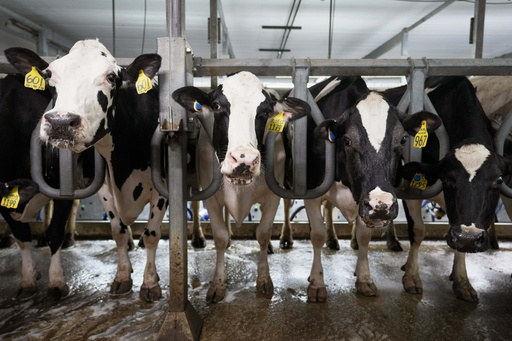The U.S. government announced on Friday that it will start testing the milk supply across the nation for bird flu, a measure aimed at closely monitoring the virus’s spread among dairy cows.
Beginning December 16, raw or unpasteurized milk from dairy farms and processing facilities will be subject to testing upon request, as stated by the Agriculture Department. This testing initiative will kick off in six states: California, Colorado, Michigan, Mississippi, Oregon, and Pennsylvania.
The purpose of this initiative is to “contain and ultimately eliminate the virus,” specifically the Type A H5N1 strain, which was first discovered in U.S. dairy cows back in March. Since its identification, over 700 herds across 15 states have been confirmed infected.
Agriculture Secretary Tom Vilsack emphasized that this testing will enhance farmers and farm workers’ confidence in the safety of their animals and their own wellbeing while supporting efforts to rapidly control the virus’s spread nationwide.
Health officials maintain that the risk of bird flu to humans remains minimal. They noted that pasteurization effectively eliminates the virus from milk, ensuring it is safe for consumption.
There has been a mounting call among veterinarians, farmers, scientists, and academics for widespread testing of milk for several months, as highlighted by Keith Poulsen, director of the Wisconsin Veterinary Diagnostic Laboratory, a key advocate for this initiative.
“This is a significant stride in the right direction,” Poulsen commented. “It’s encouraging to see the recognition that a stronger grasp on the situation is necessary.”
Despite the ongoing spread of the virus, dairy farmers and processors have exhibited hesitance in testing animals or milk for fear of potential economic consequences. Jamie Jonker, chief science officer at the National Milk Producers Federation, affirmed the industry’s support for the USDA’s measures aimed at eradicating the virus.
According to the new federal order, dairy farmers and raw milk handlers are required to submit samples for bird flu testing upon request. The order also stipulates that positive test results must be reported to the USDA, and herd owners are required to furnish essential information to aid in tracing the disease among cattle.
This move follows a federal directive from April 24 that mandated testing for specific dairy cattle before their interstate transport and required notification of any positive test results. Despite these actions, Poulsen has observed that the virus continues to propagate.
Research has shown that raw milk from infected cows contains a high concentration of the active virus. At least 58 individuals in the U.S. have been confirmed infected with bird flu, primarily farm workers who experienced mild illness after coming into close contact with either the infected cows or poultry.
The virus has also been spreading among wild birds and various other animal species.
Federal health officials reiterate warnings against the consumption of raw milk, which can harbor numerous pathogens that pose health risks. In response to the detection of the bird flu virus in raw milk sold commercially, officials in California quarantined a farm and suspended milk distribution. Raw Farm of Fresno has since issued a voluntary recall for raw milk and cream produced following November 9.



